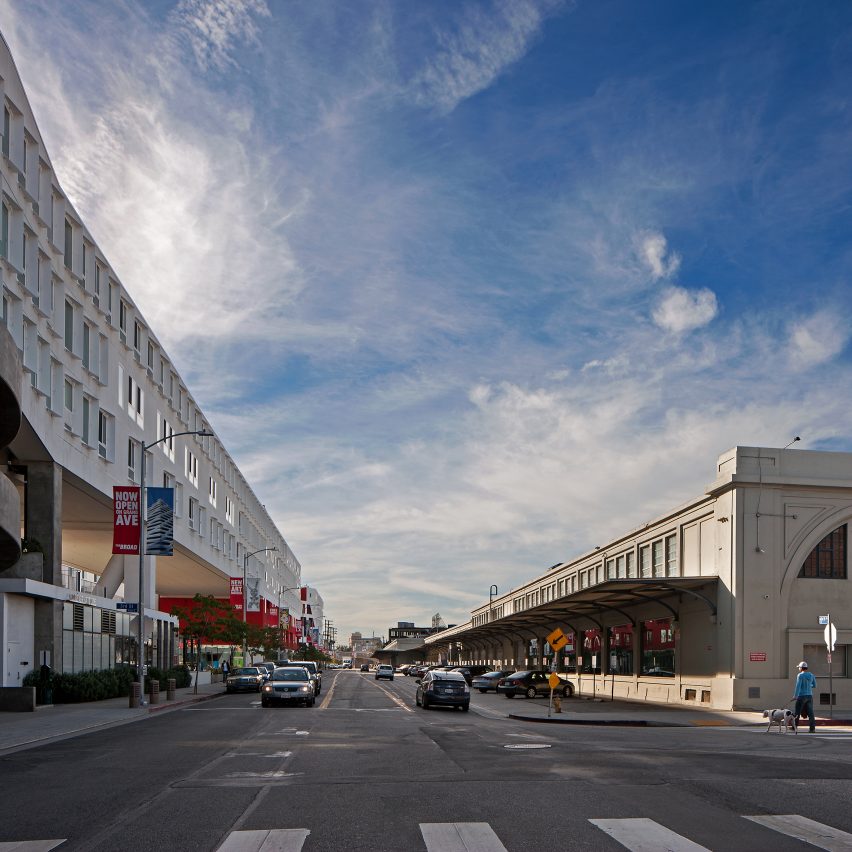
The recent events at SCI-Arc are a flashpoint for industry-wide labor grievances and must lead to systemic change writes Corie Yaguchi, a former student of the Los Angeles architecture school.
The suspension and investigation of prominent members of SCI-Arc‘s faculty are not enough to address the systemic problems in the field of architecture.
For the private California institution to even take students’ grievances seriously, it took massive public outcry after Marrikka Trotter, Margaret Griffin, and Dwayne Oyler tacitly endorsed questionable work culture norms in a discussion called How to be in an Office on March 25, which Dezeen covered here.
After an online outcry over the panel, allegations came out about the questionable labor practices of Trotter and partner, Tom Wiscombe of Tom Wiscombe Architecture, also a member of the SCI-Arc faculty.
We should all have access to an education that fulfills us
However, SCI-Arc’s decision to suspend Trotter and partner, Tom Wiscombe, after allegations of malpractice is just a bandaid when it comes to the unfair labor practices in the industry. These questionable practices run deep and masking symptoms is not the solution to the problem. Further action must be taken.
It is unfortunate that it took the outrage of hundreds of students and thousands of onlookers for an institution to begin to look out for its students and their futures.
For someone like me, who values my SCI-Arc education, I was heartbroken not only by these events but also by the fact that it’s taken this long to have a serious dialogue about these issues. I, personally, had a very positive experience throughout my time at SCI-Arc, but seeing that this is not true across the board made me furious.
We should all have access to an education that fulfills us, helps us grow as people, and propels us into a career, without needing to jump through abusive hoops to get there.
The fetishization of labor, or “hustle culture”, that has existed for decades within the institution and the field at large is toxic and creates a system where people in positions of power are able to take advantage of those they feel are beneath them. This moment seems like a turning point where people are finally saying we have had enough.
There is so much potential for change and growth
I feel it is also important to note that the problem spans far beyond these two individuals at SCI-Arc. These issues can be found everywhere – within other academic institutions, in the professional world, and in other fields as well – but that does not make them okay. While the current conversation has been very centered around SCI-Arc and specific people there, I am really hoping we are able to spark conversations all across the field.
There is so much potential for change and growth, and the information that has been brought to light in the past weeks needs to be used as a catalyst for the revolution towards more just labor and academic practices.
The silver lining throughout this moment of turmoil has been watching the way the community has come together to show their support and amplify each other’s voices. The thing keeping us afloat is each other – our fellow students and alumni.
A group of alumni hosted an alternative basecamp discussion, to show current students the many paths they are able to take as they go out and start their careers. We wanted to prove to current students that accepting an abusive workplace is not a requirement to kickstart a successful career. Many of us have jobs that we love and presented this as a counterpoint to many of the statements made during the initial basecamp held at SCI-Arc.
Another group of alumni came together to write a petition, demanding that the investigation be expanded beyond Wiscombe and Trotter, which has garnered over 850 signatures to date – the petition was sent to the SCI-Arc board on April 11 and a follow up on May 12, 2022, but both received no response.
The alumni’s voice has been loud, strong, and clear in this moment. Almost a thousand people are standing together in solidarity, hoping for a better future for SCI-Arc, a place that has both given and taken a lot from us all.
We are calling for more action and a more just future
Furthermore, these actions have been spanning different generations of SCI-Arc, as a group of alumni from the 90s have joined together with more recent grads to host an event in person, as an alternative to SCI-Arc’s 50th-anniversary celebration. The idea behind the event was to vent about the issues, value the positive points in our education, and envision the next 50 years for SCI-Arc.
The past month, while frustrating and infuriating, has also ignited so much hope and a radical form of joy knowing that, though bonded by trauma and outrage, we can all come together and channel this energy into productive action and change.
We are calling for more action and a more just future for the institution and the students to come.
The main image is of Southern California Institute of Architecture.
Corie Yaguchi is a recent graduate from SCI-Arc and works as a Junior Designer at Bestor Architecture in Los Angeles.
The post "Suspension and investigation of prominent members of SCI-Arc are not enough" appeared first on Dezeen.
